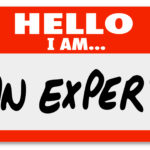I recently read Douglas Adams’s hilarious book, The Hitchhiker’s Guide to the Galaxy. In the book, the supercomputer Deep Thought is asked for the “Answer to the Ultimate Question of Life, the Universe and Everything.” After seven and a half million years of deep thought, it spits out a clear, but ultimately meaningless, answer: 42. Although the book’s fans have tried to ascribe some symbolic meaning to this number, I think there is none: Adams was simply mocking the lengths that humans will go to find the right answer to everything.
There are two major problems with right answers: They often don’t exist. And when they do, they don’t matter very much.
Absolute certainty is a mirage. In life, choices rarely present themselves with clarity. We’re required to act based on imperfect information and make a call with sketchy data. Consequently, the “right” answer tends to elude us.
This makes most of us (including me) profoundly uncomfortable. After all, we’ve been spoon fed the right answer for most of our lives. Knowledge was a baton to be passed. There was one curriculum, one right way to interpret history, and one right path to an A.
Back in high school, I once got the right answer on a math exam using a different method than the one taught in class. Much to my surprise, I lost half the points. When I asked why, the teacher, who always wore heavy cologne, leaned—no, wafted—over to my desk to explain to me that there was one right way to reach the right result that he had taught in class. I should take my non-conformist inclinations elsewhere, thank you very much.
These educational realities come close to the dystopia Ray Bradbury sketched in Fahrenheit 451 (which I recently re-read):
“Give the people contests they win by remembering the words to more popular songs or the names of state capitals or how much corn Iowa grew last year. Cram them full of non-combustible data, chock them so damned full of ‘facts’ they feel stuffed, but absolutely ‘brilliant’ with information. Then they’ll feel they’re thinking, they’ll get a sense of motion without moving. And they’ll be happy because facts of that sort don’t change.”
Bradbury repeats the same point in a different part of the book: “If you don’t want a man unhappy politically, don’t give him two sides to a question to worry him. Give him one.”
In politics, and in life, we assume nuances don’t exist and the arguments on the other side are nonsense. We keep grasping for the elusive “right answer” as Sisyphus rolls his eyes at us.
Clarity is comfortable. Clarity is simple. Acknowledging the complexity of an issue, or admitting that there’s more than one answer, is far more difficult than taking a firm stance. Nuances don’t make for good sound bites or stump speeches. It’s far easier to pretend they don’t exist.
In our professional lives, we prefer jobs with certainty and stability. Instead of taking risks, we opt for predictable strategies with predictable outcomes. Life becomes a race to the center.
But the stability that certainty provides is a false one. Be careful if your job consists of determining a series of right answers. If the right answer is easy to uncover, your job can be automated or outsourced.
What’s more, when we see the world as a series of right answers, we don’t bother to question them. Authorities turn right answers into sacred truths. If the powers-that-be already decided that the Earth is flat, that heavy objects fall faster than lighter ones, or that dietary fat is bad for you, we can move on. There’s no reason to rock the boat.
Even when there’s a single right answer, it usually doesn’t matter much. By that point, everyone has moved on. I commonly give this example in my constitutional law class: “Can a 25-year-old be elected President of the United States?” There’s one right answer under the U.S. Constitution: No. But knowing the answer to that question won’t make a difference or set you apart. The answer is a Google search away.
Breakthroughs happen when we stop seeing the world as a series of right and wrong answers, when we take our training wheels off, and when we step outside of our comfort zone where clarity is nowhere in sight.
The people who thrive in the Information Age are those who embrace uncertainty, rather than reject it, and dance with hard calls and tough judgments.
You’ll know you’re on the right path when there’s no guarantee that your approach will work.
The next time you’re tempted to look for the right answer, heed this advice from the Indigo Girls:
And I went to the doctor, I went to the mountains
I looked to the children, I drank from the fountains
There’s more than one answer to these questions
Pointing me in a crooked line
And the less I seek my source for some definitive
The closer I am to fine
Bold



